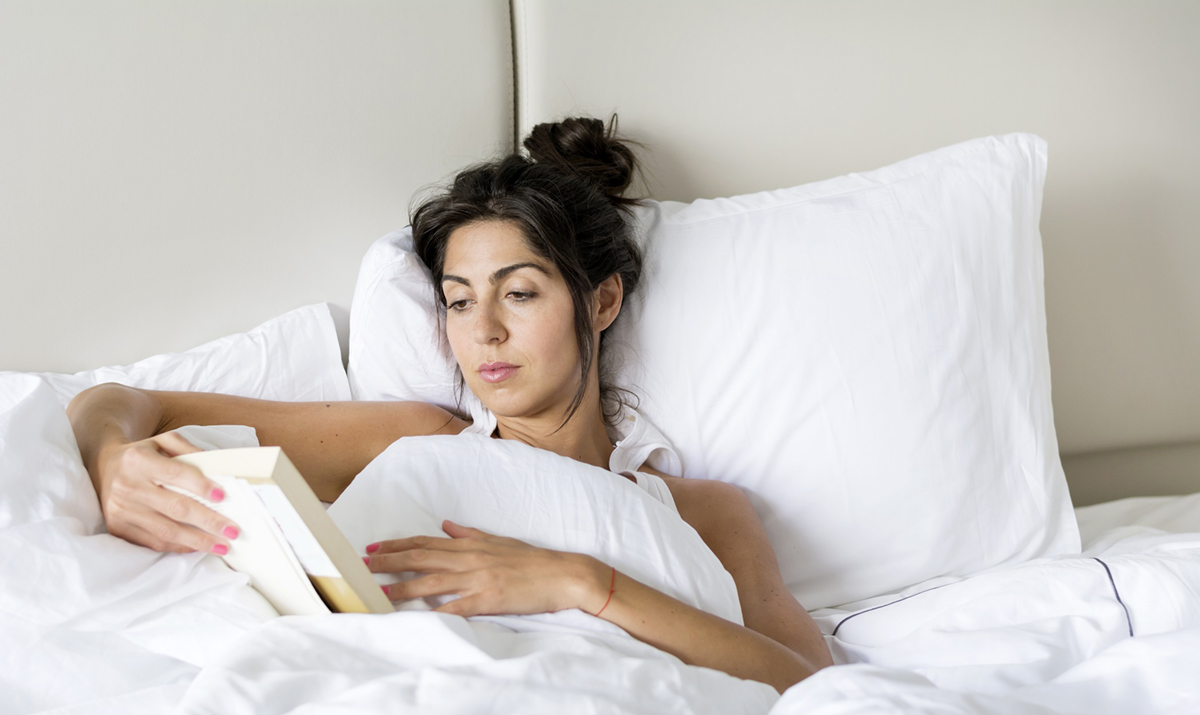Table of Contents
Relax Before Bed
Before you go to bed, get into the habit of spending 30 to 60 minutes doing soothing activities. By getting into a routine, you wind-down from your stimulated state and tell your brain that it's time for sleep.
Good ideas include:
- Take a soothing soak in the bath
- Practice mindfulness meditation, or deep breathing exercises
- Listen to soothing music
- Read a book

Aim to Sleep Before 10 p.m.
If you're not asleep by ten, you can expect your brain and body to come alive at that hour. That's because melatonin ramps up. Melatonin is supposed to help your body repair and rejuvenate (which it does best between ten and two in the morning). But, if you're awake, you may find yourself buzzing like a wire, unable to get to sleep at all.
When your body revs up, your mind can suddenly come alive with ideas and plans. If you throw on your light and spend an hour scribbling them down until you feel fatigued again, you're likely to feel tired in the morning.
Best to try and be asleep before then.
Be careful with pillows
Sleeping on your back: Don't use a thick pillow. That will push your neck out of correct alignment with your spine, causing headaches, neck pain, and back pain. Sleep on your back with one thin pillow, comfortable enough to support the natural curve of the neck, but lower than for side sleepers.
Sleeping on your side: Use a single comfortable pillow. It should hold your head in a straight line. For additional comfort and to keep your hips and spine in alignment, put a single, firm pillow between your knees.
Sleeping on your front: Don't use a pillow under your head. This will hyperextend your neck and cause pain. Instead, place a small, firm pillow under your belly to support your hips and the small of your back. Alternatively, a pillow beneath your pelvis might be more comfortable.
READ Different Treatment Options For Neck Pain: How Effective They Are?
Sleep in the Nude
Sleep Expert Shawn Stevenson suggests his patients sleep naked. When our body temperature is high, it's harder to sleep. Studies suggest that insomniacs have a higher body temperature at night than those who get a sound sleep. Sleeping in the buff might help lower your temperature; keeping your room a pleasant 16c to 20c may also help.
Research by the University of Pittsburgh School of Medicine found that cooling the body helped insomniacs to sleep. When insomniacs were fitted with "cooling caps", they fell asleep up to 16 minutes earlier.
If you Can't Sleep, Get Up
Finally, if you can't sleep, don't just lie there and think about it. If it's been 20 minute's and the Sandman still hasn't arrived, get up and do something soothing (such as reading or listening to music) until you feel drowsy again.
Lying in bed, watching the minutes tick by and hoping to fall back to sleep only removes the association of your bedroom and sleep, making it harder to fall asleep while lying in your bed in future.
READ Differences between Sleep Apnea and Sleep Enuresis
Can't I Just Take Medication?
There are over-the-counter and prescription medications available for insomnia. However, they're only recommended for between a few days to two weeks at a time, and become less effective over time. That means practicing good sleep hygiene (where you get up and go to bed at a good hour, and relax before bed) is more effective long-term for many patients.
However, some patients suffer with a medical condition that causes poor sleep and fatigue, such as sleep apnoea (where you stop breathing for short periods while you sleep). Still others continue to suffer insomnia, even when practicing healthy living.
These tips might not work for you. However, they are a safe way to try and ease your insomnia.
If they don't help within two weeks, always see a doctor for further advice.
- www.alaskasleep.com/blog/insomnia-facts-symptoms-causes-treatment-poor-quality-sleep
- www.dailymail.co.uk/health/article-3763806/Want-best-sleep-life-bed-NAKED-Expert-reveals-10-easy-ways-banish-insomnia.html
- www.ncbi.nlm.nih.gov/pubmed/19345124
- sleepfoundation.org/insomnia/content/what-causes-insomnia
- www.nhs.uk/Livewell/insomnia/Pages/insomniatips.aspx
- www.nosleeplessnights.com/sleep-hygiene/bedtime-routine-for-adults
- sleepfoundation.org/insomnia/content/what-do-when-you-cant-sleep
- www.spine-health.com/wellness/sleep/pillows-different-sleeping-positions
- www.everydayhealth.com/sleep/101/improve-sleep.aspx
- Photo courtesy of freepik.com
- Photo courtesy of freepik.com
- Photo courtesy of


Your thoughts on this